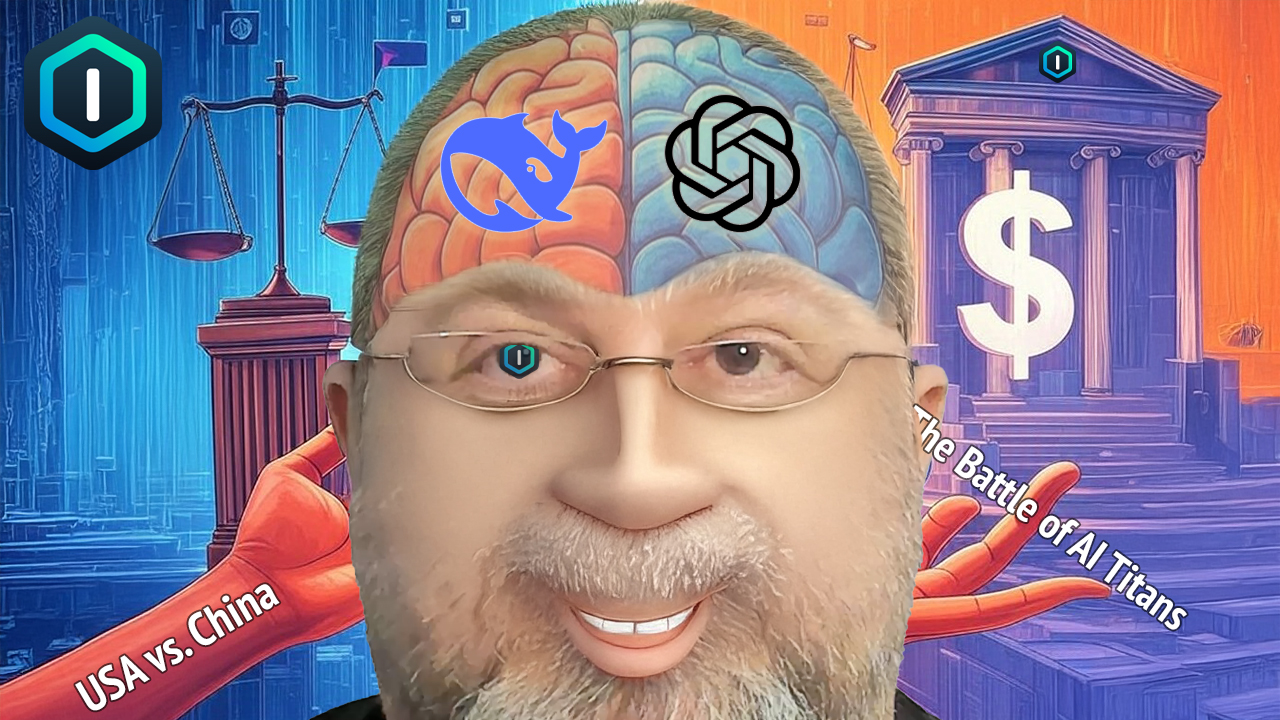Listeners:
Top listeners:
-
 play_arrow
play_arrow
Decentralizing AI - Navigating the Future of Work with AI
-
 play_arrow
play_arrow
Life Tips - From Video Games to Virtual Reality: Henry Woodman's Journey
-
 play_arrow
play_arrow
Cool Smart People - The Art of Storytelling in Tech
-
 play_arrow
play_arrow
Old Tech - Integrating Old and New: The Future of Technology
-
 play_arrow
play_arrow
Cool Smart People - Revolutionizing Diabetes Care with Technology
-
 play_arrow
play_arrow
Life Tips - From Trauma to Triumph: Alan Lazaros' Journey

From OpenAI to DeepSeek: The Turbulent Journey of AI Innovation, Ethics, and Global Competition
New Tech Roberto Capodieci 02 February 2025
Introduction
Artificial intelligence is evolving at breakneck speed, and two names repeatedly make headlines: OpenAI and DeepSeek. But behind these big players lies a complex narrative involving shifting missions, legal controversies, and international tech rivalries. This blog post unpacks the major developments, drawing on publicly available sources to paint a fuller picture of where AI stands—and where it might be headed.
1. OpenAI’s Founding & Shift to a For-Profit Model
OpenAI was established in 2015 with a bold promise: make AI technology accessible for the benefit of all humanity. Funded in part by tech luminaries including Elon Musk, its initial non-profit vision resonated with developers and researchers worldwide. Musk served on the board until 2018, before stepping away over internal disagreements.
However, in 2019, OpenAI transitioned to a “capped-profit” structure—meaning it could generate returns for investors but purportedly within a 100x limit. Critics argue this move paved the way for for-profit priorities that overshadowed its founding ethos. By March 2024, Elon Musk sued OpenAI, alleging the organization breached its original non-profit mandate and strayed from its open, transparent principles
2. Data Collection & Copyright Challenges
One of the main controversies surrounding OpenAI is how it gathers the massive amounts of data required to train models such as GPT-4:
- Scraping the Internet: OpenAI collected text from sources that included copyrighted books, news articles, and other material without explicit permission.
- High-Profile Lawsuits:
- New York Times filed suit in late 2023, alleging that ChatGPT reproduced paywalled content
- The Authors Guild took legal action on behalf of prominent writers (Sarah Silverman, George R.R. Martin), claiming their works were used without consent
- Getty Images’ lawsuit demonstrated that DALL-E, OpenAI’s image model, could replicate watermarks from their database
These cases underscore the legal gray areas of AI training practices and the urgent need for updated regulations on data rights.
3. Transparency & Privacy
Beyond intellectual property, privacy stands out as a pressing concern:
- Free Tier Data Collection: Researchers discovered some ChatGPT conversations were included in public datasets—a potential breach of user trust.
- Regulatory Scrutiny: The U.S. Federal Trade Commission (FTC) launched an investigation into how OpenAI handles personal information, focusing on possible misuse of user-generated content
- Canadian Defamation Case: ChatGPT logs played a role in defamation proceedings, spotlighting how user conversations can unexpectedly appear in court
4. GPU Export Restrictions & Global Tensions
As the U.S. solidifies its tech leadership, it has imposed export controls on high-performance GPUs (like NVIDIA’s A100/H100) destined for China. This policy goal: limit China’s ability to develop powerful AI systems. Yet it also accelerates Chinese firms’ efforts to build domestic semiconductor alternatives, exemplified by Huawei’s Ascend chips
This dynamic is prompting a technology “arms race” of sorts, as both nations race to develop or secure hardware crucial for training advanced AI models.
5. The Emergence of DeepSeek
Enter DeepSeek, a Chinese-based contender that dramatically shifted the AI conversation. On the day of Trump’s inauguration in January 2025, DeepSeek launched its R1 model, claiming:
- Equivalent or Superior Performance: Allegedly matching or outpacing previous GPT models in benchmark tests.
- Significantly Lower Training Costs: DeepSeek reported a training budget of around $6 million, far below the estimated $100 million+ spent on GPT-4
While independent verification of these claims is ongoing, the announcement sparked market panic—NVIDIA lost roughly $600 billion in valuation
This reaction reflects broader fears that AI development barriers might be lower than previously assumed.
6. IP Disputes & Misinformation
OpenAI swiftly accused DeepSeek of intellectual property theft, suggesting DeepSeek reverse-engineered GPT models for R1. Critics retort that if OpenAI had remained truly open-source, such accusations would carry less weight
To complicate matters, many third-party models on platforms like Hugging Face falsely claim to be affiliated with OpenAI, contributing to widespread model confusion. Meanwhile, DeepSeek asserts its training data is “clean” but admits that open-source repositories often mix in content generated by other AI tools, risking model collapse or degraded performance over time.
7. Local vs. Cloud: The Great Deployment Debate
DeepSeek’s success also revitalizes the conversation about local AI deployment versus cloud-based services:
- Local Deployment: Advocates emphasize data privacy and user control, especially amid concerns about surveillance—whether by Western or Chinese entities
- Cloud Advantages: Centralized models generally offer better performance, scalability, and seamless updates, but come with trade-offs in user autonomy and data collection.
8. The Bigger Picture: AI’s Future at a Crossroads
All these developments underscore a broader trend: AI is no longer just a research endeavor—it’s entangled with profit motives, global power plays, and urgent ethical debates. The early dream of a purely open, collaborative AI ecosystem has largely collided with corporate pressures and geopolitical realities.
International frameworks that address intellectual property, privacy, and fair competition are becoming imperative. Whether you believe DeepSeek’s cost-efficiency claims or remain skeptical, it’s clear that the industry’s center of gravity is shifting—and fast.
Conclusion
The OpenAI vs. DeepSeek story is about much more than competition between two companies. It reveals how commercial imperatives can shape a technology once championed for its “openness,” and how global tensions can spur rapid innovation—even amid restrictive policies. As the AI world evolves, keeping a global perspective on data usage, privacy, and equitable access remains crucial.
Search
Sign up to Interchain Me Newsletter
Blog News
Apply to be a guest
🎤 Want to be a guest on one of our podcasts? Whether you’re an expert in blockchain, a tech enthusiast, or an AI aficionado, we’re looking for guests across all our series, including “Life Tips,” “New Tech,” “Old Tech,” and “Past Predictions.” Share your insights, experiences, and expertise with our audience! Apply now for a chance to join us as a guest. 🎙️✨

🎧 Got a topic in mind for our next podcast? Help shape the conversation by suggesting an episode idea! Choose from categories like “Cool Smart People,” “Decentralizing AI,” “Learn with Rob,” “Life Tips,” “New Tech,” “Old Tech,” “Past Predictions,” “Rob’s Memory Lane,” and “Throwback Thursday.” We’re eager to hear your ideas and create content that resonates with you. Share your suggestion today!
(C) 1974-2024 Roberto Capodieci









Be the first to leave a comment